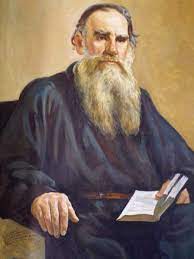Leo Tolstoy life and works
Updated: 3 March 24
5
Introduction
Leo Tolstoy, born on September 9, 1828, in Tula Province, Russia, and passing on November 20, 1910, is one of the most renowned authors in the annals of literature. His contributions to Russian literature and the broader literary canon are immense, with his works extending beyond fiction to include essays, philosophical treatises, and personal reflections that continue to influence readers and thinkers around the world.
Tolstoy’s literary output is characterized by an unyielding pursuit of truth, a profound understanding of human nature, and an enduring commitment to moral and spiritual questions.
| Key Works |
|---|
|

Literary Style and Themes
Tolstoy’s literary style is distinguished by its detailed realism, deep psychological insight, and moral seriousness. He was adept at creating complex characters and settings that vividly capture the social and spiritual dilemmas of his time. His themes often revolve around the moral struggles of individuals, the injustices of society, the quest for meaning in life, and the pursuit of spiritual truth.
Awards and Recognition
While the concept of literary awards as we know them today did not exist during Tolstoy’s lifetime, his work received immense critical acclaim and has been honored posthumously by being included in countless lists of the greatest works of literature ever written. His influence on literature and philosophy is immeasurable, and his novels remain essential reading in literary studies worldwide.
Influence and Contribution
Tolstoy’s contributions to literature, philosophy, and ethics are profound. His works have influenced countless writers, thinkers, and public figures over the years, from Virginia Woolf and James Joyce to Mahatma Gandhi, with whom he corresponded on the subject of nonviolent resistance. Tolstoy’s exploration of Christian ethics, particularly in his later works, has also left a significant mark on religious and philosophical thought.
Personal Life
Tolstoy’s life was as complex and fascinating as his novels. Born into Russian nobility, he experienced a profound moral and spiritual crisis in midlife, leading him to adopt a radical form of Christian anarchism. His beliefs in nonviolence, vegetarianism, and a simple life led to conflicts with the Russian Orthodox Church and his own family. Despite his tumultuous personal life, his works continued to preach love, nonviolence, and peace.
FAQs
What are the central themes in Tolstoy’s works?
Central themes include the quest for meaning in life, moral struggles, social injustice, and the importance of love and family.
Why is “War and Peace” considered a significant work?
It is celebrated for its ambitious scale, profound philosophical insight, and the masterful way it integrates historical events with personal narratives.
How did Tolstoy’s personal beliefs affect his writing?
His radical moral and spiritual beliefs, especially later in life, deeply influenced his writing, leading him to focus on themes of ethics, justice, and spiritual awakening.
What impact did Tolstoy have on later writers and thinkers?
Tolstoy’s works and ideas have profoundly influenced a wide range of individuals across different fields, promoting discussions on nonviolence, spirituality, and the human condition.
How is Tolstoy regarded in Russia and internationally?
Tolstoy is revered as one of the greatest writers in Russian literature and a towering figure in world literature, whose works continue to be widely read and studied globally.
Please Write Your Comments